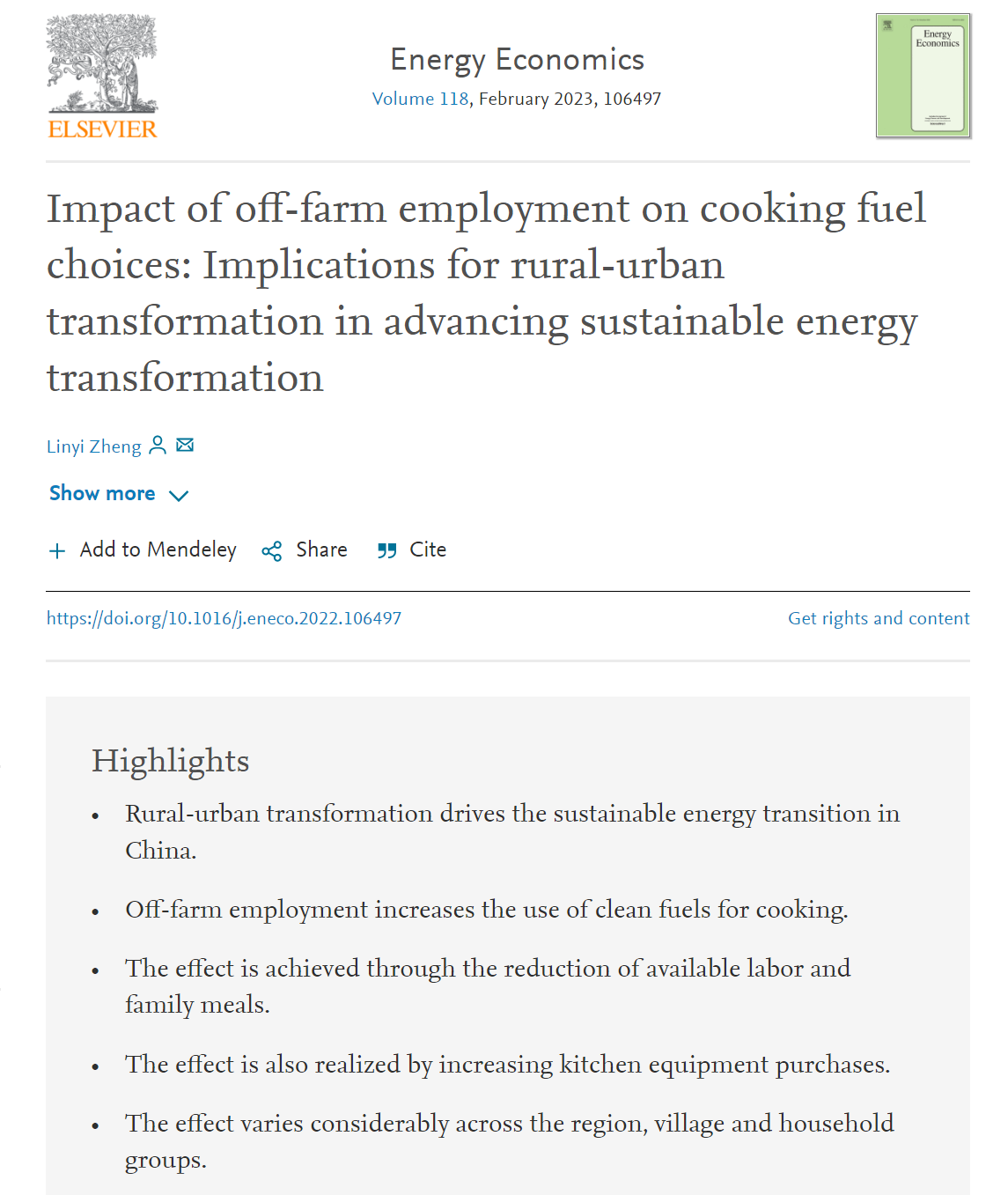浙江大学中国农村发展研究院
浙江大学中国农村发展研究院特聘副研究员郑淋议独立撰写的学术论文“Impact of off-farm employment on cooking fuel choices: Implications for rural-urban transformation in advancing sustainable energy transformation” 在能源经济学领域SSCI期刊Energy Economics在线发表。Energy Economics为SSCI一区期刊,最新影响因子为9.252,在ECONOMICS大类中排名为9/381。

Abstract:
Off-farm employment is a prominent manifestation of rural-urban transformation in developing countries, and it theoretically plays a critical role in rural sustainable energy transformation. Exploiting the nationally representative household-level panel data from the China Labor-force Dynamics Survey (CLDS), this study employs a multi-dimensional fixed-effects (MDFE) model, an inverse probability weighted regression adjustment (IPWRA) technique and a propensity score matching (PSM) approach to investigate the impact of off-farm employment on cooking fuel choices. The results show that off-farm employment exerts a positive and significant impact on the probability of adopting clean fuels for cooking, with specific reductions in biomass and coal and increases in electricity and gas. Furthermore, this effect is mainly realized by reducing the amount of available labor, the number of family meals, and increasing kitchen equipment purchases. However, the relationship between off-farm employment and cooking fuel choices varies considerably across the region, village and household groups. Off-farm employment mainly benefits the eastern, central and western regions of China, villages in plain areas, with brick-concrete houses and ethnic Han Chinese, households with children or the elderly, with poor health and more females, while it is less beneficial for others. The study highlights the important policy implications of rural-urban transition for sustainable energy transition through the creation of off-farm jobs.
文章概要:
非农就业是发展中国家城乡转型的突出表现,它在理论上对农村能源可持续转型起着至关重要的作用。本研究利用具有全国代表性的中国劳动力动态调查(CLDS)数据库的家户面板数据,采用多维固定效应(MDFE)模型、逆概率加权回归调整(IPWRA)技术和倾向得分匹配(PSM)方法考察了非农就业对农村居民烹饪燃料选择的影响。结果表明,非农就业会增加农村居民采用清洁燃料做饭的概率,具体表现为生物质和煤炭燃料的减少,以及电力和天然气燃料的增加。此外,这一效应主要通过减少可用劳动力数量、家庭聚餐次数和增加厨房设备采购来实现。然而,非农就业与烹饪燃料选择之间的关系在区域、村庄和家庭群体之间也存在很大差异。非农就业主要惠及中国东中西部地区(与东北地区相比),位于平原地区、以砖混住房为主和以汉族为主体的村庄,以及抚养比较高、健康状况较差和女性较多的家庭,而对其他地区农村居民的受益程度较低。该研究强调了通过创造非农就业机会,以城乡转型推动农村可持续能源转型的重要政策意涵。
原文链接:
Zheng L. Impact of off-farm employment on cooking fuel choices: Implications for rural-urban transformation in advancing sustainable energy transformation. Energy Economics, 2023, 118, 106497,
https://doi.org/10.1016/j.eneco.2022.106497.
https://www.sciencedirect.com/science/article/pii/S0140988322006260?dgcid=author
《Energy Economics》 . 2022


